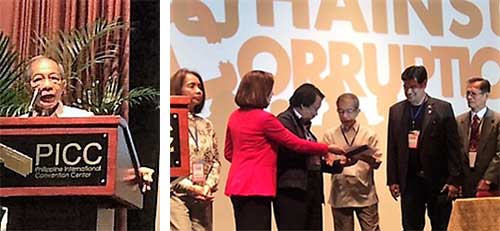Institutional reforms needed to fight corruption – CenPEG
CenPEG.org
Nov. 30, 2017

(Left photo) Temario C. Rivera. (Right photo) Summit organizers thank Rivera (l-r) Merle J. San Pedro, VACC secretary general; Cory Quirino; Dante L. Jimenez, VACC founding president; Martin Dino, current VACC chair; and lawyer Eligio Mallari. CenPEG photo
Having a “decisive” president is not enough to curb corruption in the government bureaucracy. Decisive leadership should be accompanied by having a strong state and institutional reforms. “You may have a very decisive leader but decisiveness is not enough. You need also a consensus and what the public interests are that need to be pushed forward, protected and advanced.”
Dr. Temario C. Rivera, Board chairman of the Center for People Empowerment in Governance (CenPEG), emphasized this point in his talk during the “Anti-Corruption Summit: Break the Chains of Corruption” on Nov. 27-28, 2017 held at the Philippine International Convention Center (PICC), Pasay City. The summit was organized by the Volunteers Against Crime and Corruption (VACC) and Vanguard of the Philippine Constitution.
Rivera, who also teaches graduate political science at the University of the Philippines (Diliman), cited the 9-point approach to fighting corruption in the Philippines (WB, 2000) which includes: reducing opportunities for corruption by policy reforms and deregulation; increasing public oversight together with passage of a Freedom of Information law, Whistleblower’s Law, genuine public participation in LGU development councils; improving Meritocracy in the Civil Service complemented by providing adequate compensation and accountability for performance; targeting selected departments and agencies; enhancing sanctions for corruption; strengthening capacity of the Ombudsman’s Office and the Sandiganbayan; fast-tracking prosecution of a few high profile pending cases of graft and corruption; capacity building in forensic audit at COA and corruption prevention at the CSC; supporting judicial reforms.
The other speakers were Dr. Clarissa Carlos, also of the UP political science department, who talked on “The Anatomy of Corruption in the Philippine Context,” and Dr. Eduardo Araral of the Lee Kuan Yew School of Public Policy (National University of Singapore), who spokes on “War on Corruption: Lessons from Singapore, China, and Indonesia.” CenPEG News
- Smartmatic and the Venezuela Electoral Fraud
- Venezuela's Maduro Accuses Smartmatic of Caving to US Pressure
- What could have been done
- SUMMER IN BIKOL FIELDS Learning governance at ground level
- Prospects and Intricacies of a Peace Agreement in the GPH-NDFP Negotiations
- THE CIA IN THE PHILIPPINES: A BRIEF HISTORY
- Military intransigence in the peace talks
- Slim chance of deal in peace talks
- Revisiting Istanbul Principles and its Relevance to Philippine CSOs
- Paving the Way for Philippine CSO Development Effectiveness Work
- THINK TANKS PRESS FOR BILATERAL CEASEFIRE AGREEMENT
- Now more than ever, resume the peace talks!
- The judicious spending of taxpayers’ money: Does it matter?
- ‘Narco politics’ cannot be invoked to replace the people’s right to vote
- Probing presidential platforms
Center for People Empowewrment in Governance (CenPEG), Philippines. All rights reserved


